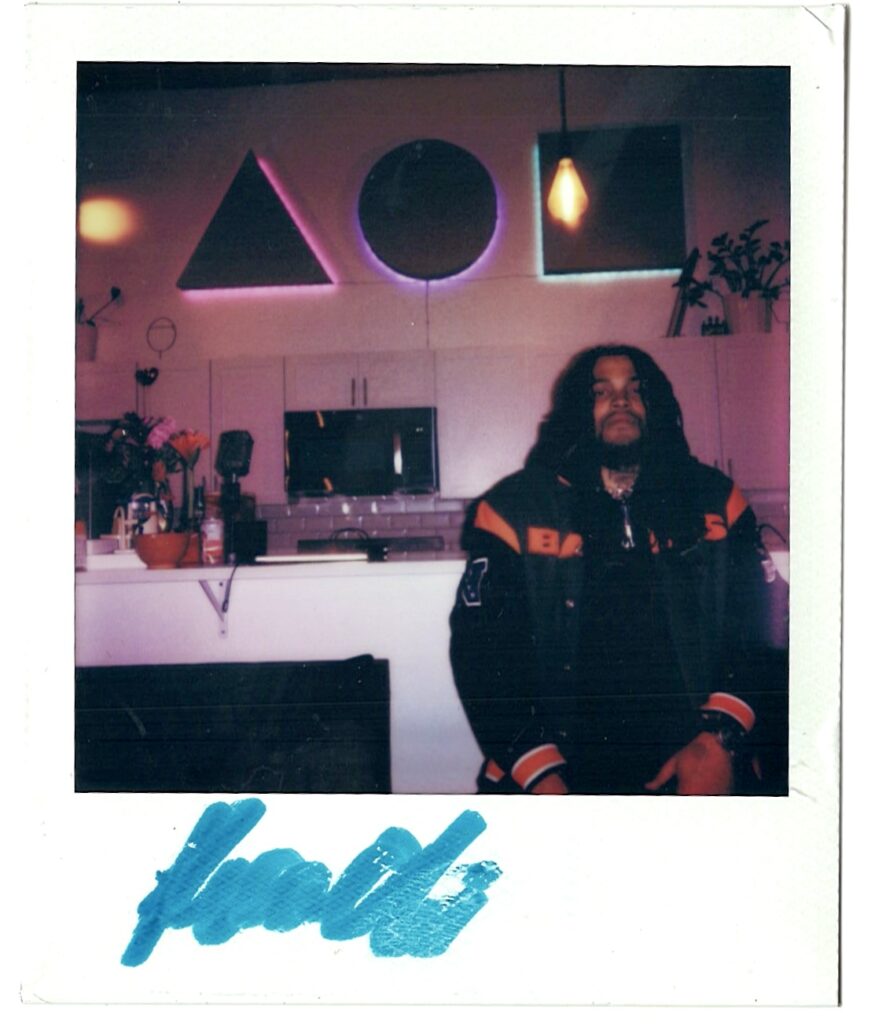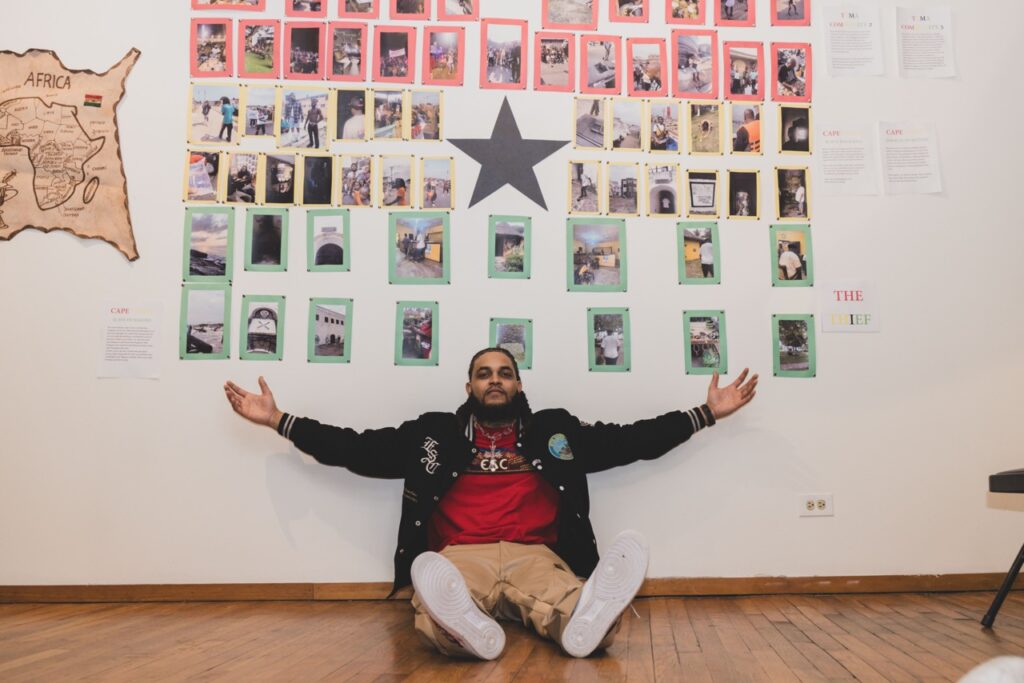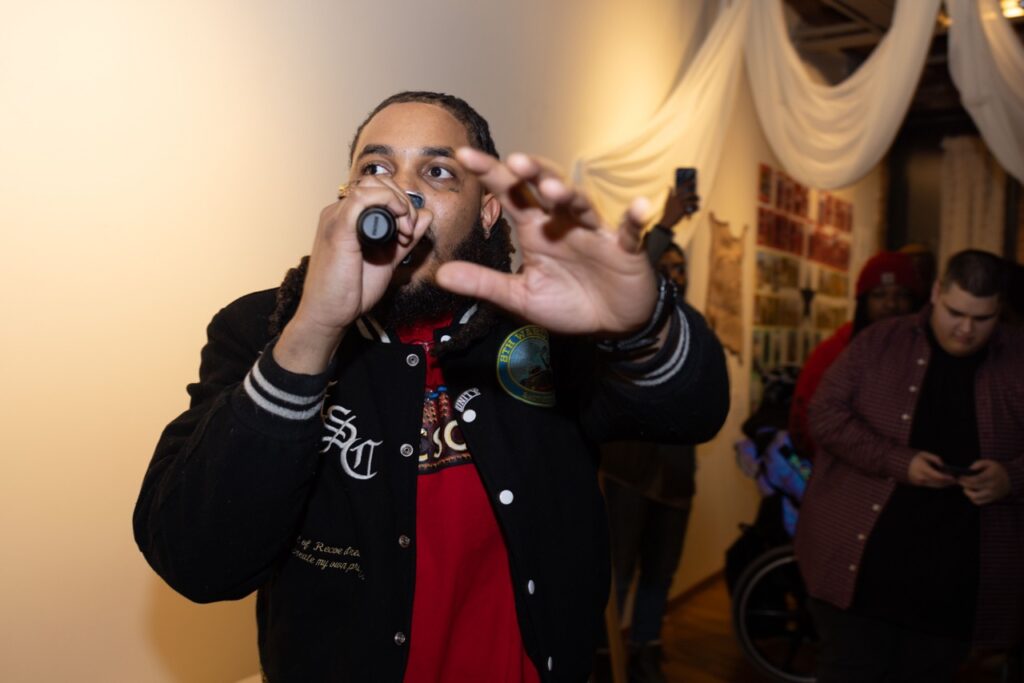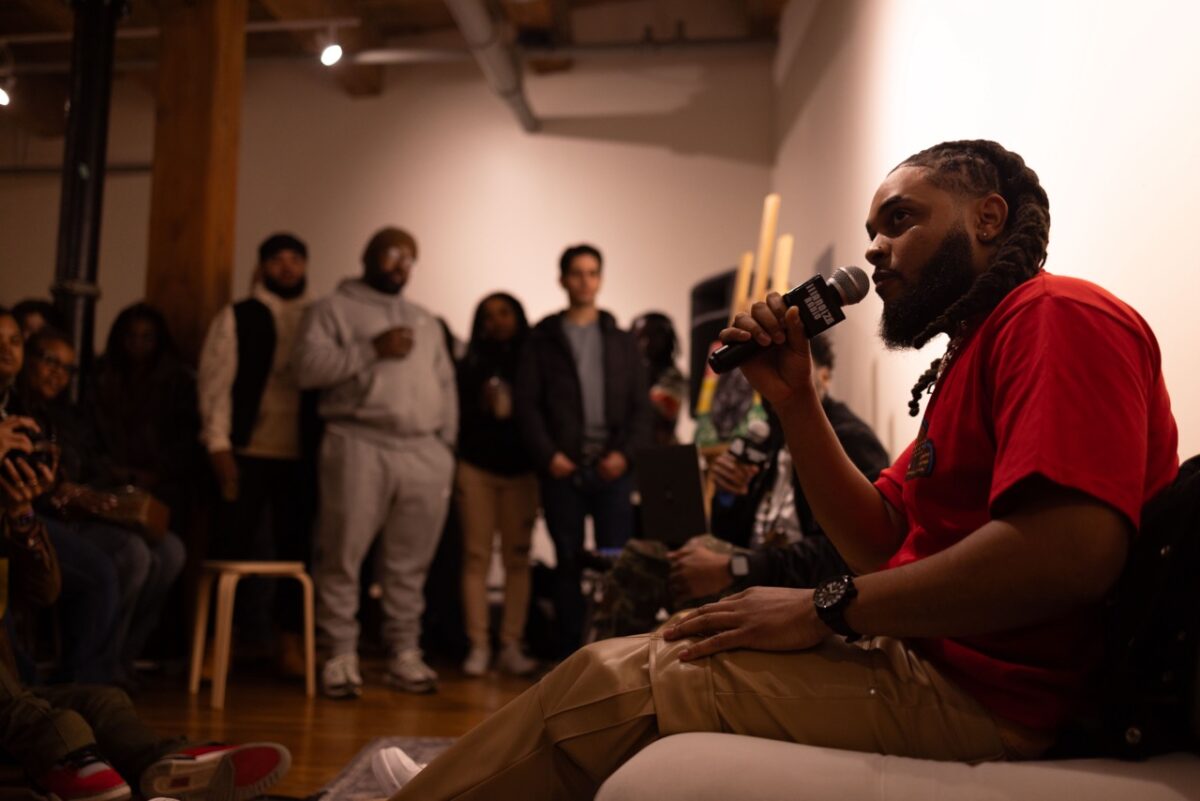A good portion of Chicago’s community work has been carried on the shoulders of underground artists, activists, and voices of the people for at least the past fifty years. From being a shorty on the block to an adult with free will, I can’t help but to acknowledge those in my community who stand on big business and are distinct.
Recoechi, also known as Recoe, began his journey into community organizing around 2021, inspired by his close friend and fellow rapper, Mani Jurdan, and his work with Kidz Express on the West Side of Chicago. In 2022, Recoe became involved with the Males 2 Men program through Brother Enoch Muhammad’s Hip-Hop DetoxX initiative, where he spoke to high school students, particularly troubled youth. Through these interactions, he connected with young people seeking summer jobs and opportunities to stay off the streets.
In 2023, Recoe brought ten young Black men from the South Side to participate in Healthy Hood’s One Summer Chicago programming. His efforts earned him the role of captain at Healthy Hood, where he helps coordinate music programming, manages intake for young people interested in mentorship, and works alongside Chairman Allen Washington-Lozano on youth development initiatives. Recoe credits Washington for teaching him how to facilitate programming and has received valuable guidance from Rev. Tanya Lozano Washington to deepen his political education. Additionally, Recoe continues to advocate for stronger safety and security measures at Healthy Hood in response to external threats, in hopes of a safer environment for their community.
Earlier this month, right-wing content creator Ben Bergquam posted an Instagram video of himself accosting Pastor Emma Lozano and Healthy Hood Chairman Allen Washington outside Lincoln Methodist Church, saying their work was “aiding and abetting the invasion” of the United States.
“That’s foul play. Why the fuck do they get to come up here and do that?” Recoe said. “A lot of people do not want to see Mexicans, Black folks, and other communities come together. People don’t want to see others, whatever sex you is, come together—they don’t want to see that at all.”
While hearing Recoe share his experience and growth as a Black man in Chicago, both as an artist and community leader, I saw hope for our city again. Some people might have looked at you sideways if you didn’t agree with the violence and gang affiliation that were starting to rise in the city’s artistry. Seeing someone take the time to invest themselves in radical education and a connection with God, while rediscovering the true meaning of hip hop gives me hope.

So, in what ways does Recoechi uplift his core values in his art? In an interview with the Weekly, Recoe reflected on his youth, his most recent trip to Ghana, his timeline with God, and how his new project, “FLAVAZ,” is going to foreshadow his artistic journey to come.
This interview has been edited for clarity and length.
Who is Recoechi?
Aw man, that’s a broad question. Recoe, he’s a child of God, he’s an artist, he’s family oriented. I’m a captain at Healthy Hood. That’s just the beginning. I’m also a solar installer, […] I be throwin’ that out there. Don’t come find me because you’re not gonna find me, I’m commercial, baby we movin’ [laughs]. Real talk though, that’s what I live by, Recoechi is a man who lives by grace. Ase.
Where are you from?
I’m from the East Side of Chicago, Eighth Ward. Stony Island, Jesse Owens Park, Russell Square Park, Cole Park: if you know, you know.
What about your personal experiences led you to community work?
Seeing how I was brought up. I feel like I was learning things when my pops took it upon himself to coach us in baseball, and when I got older in high school he kind of took his hands off. I felt like this was the time where we really needed y’all to come grab us. So I look at it in that aspect—not saying that my dad [didn’t try], my dad is amazing. But what I learned from that situation was that we gotta cling to the shorties when they get to this age ‘cause we the adults now. So when we see these shorties coming up during those times and they start to veer off to these streets, that’s what we be doin’ at Healthy Hood, finding kids. We do that work, period, we see ourselves as healers in our community, and not just mufuckas out here talking-it.
[At Healthy Hood] you’re actually takin’ it upon yourself to mentor a child when you have your own adult problems, and that’s why people shy away from [mentorship] because they feel like, “I ain’t perfect, what the fuck I look like telling a shorty this and that when I’m fucked up,” but dawg, the little thing that you accomplished so long ago, that’s probably her or his biggest moment right now. Your little knowledge can really help out, I got that directly from my relationship with my father. The men in my family in general, everybody shows love, but nurturing is a thing. You can show love, but [you need] somebody to nurture you and give you that wisdom, that’s community building. I’m a community builder just off the strength of what I realized in my house. Like I said, I kept that structure and discipline from when my dad was on me, when he was coaching me, he showed me that I was a leader, and I took that to this day, that’s something I kept with me, even though me and his relationship wasn’t the best one.
What is the intersection between your community work and your artistry? How does what you do for the community reflect what you do as an artist?
I’m a musician, I’m a rapper, whatever people want to call it. When you have a platform like that, it is not to be played with. When you get any type of platform where you have the opportunity to speak, you got to be able to speak on what’s going on with the real people. My music gives me a voice so people can listen to my true feelings, my true thoughts. When I put this in a rhythmic fashion, now motherfuckas want to listen, but it’s cool! I make hard-ass music but I put in real political opinions. Some people are scared to touch these things. Your gift, whether you’re an actor or a motherfuckin’ astronaut, when you get on that mic or whatever the case is, when you get an opportunity to speak, say some real shit about what’s going on in the world. Speak your piece. That’s why I am an artist, I put my community work into music. We livin’ what we rap, in every sense.
Not only did you do community work in Chicago, but you went to Ghana. Tell me about your experience going to Ghana, both as a rapper and a community activist.
Firstly, I want to say thank you to the Black Panther Cubs, and thank you to [Panther Cubs] Chairman Fred Hampton Jr. for providing me with the opportunity to go to Ghana. Just like you stated in the question about community service, this came about because I was doing Cub community service for Chairman Fred Hampton Jr. He took me under his wing sometimes. It was a lot to be on this trip, but it was actually a dream come true to go out to Ghana with him because growing up I used to listen to Chairman Fred Hampton Sr. in my [headphones]. When I went to Africa it wasn’t to do community service. But I learned.
We was in Tema Community Two, Tema Community Five, we were in Accra, we visited Elmina, Ghana where the slave dungeons were…. They called it a castle, [they’re] wild as hell for that. It’s people out there trying to do community work with less, like way less. It’s ridiculous. We’re sending $500 from what we raised at the Taste of Ghana, that’ll be almost 7,000 cedis. This shit will go a long way because on average they make [around] $50 a month, which is 700 cedis. So, if I send them 5,000 cedis, you can imagine what that would do for them. Tema Community Two is the foundation of the community, so when families run out of foods such as plantains or other resources, their community suffers.
One thing that I would say really changed my perspective when I got back to Chicago was like dawg, when we do community work it has to be different. I stepped back on community work for a while because it was only one organization that I felt was doing a super amazing job, and that was Healthy Hood, which is who I’m with. Their approach was different because they been to Cuba before, so they know how people’s living conditions are outside of the United States, so they came back with a sense of grace. We all come back with a sense of grace. So when I came back from Africa, one of the Oracle ladies was telling me that they live by the proverb, “Grace is the key of life.” When you fall from grace, you fall from heaven. You can’t fall from grace, remember that’s how you lead your life.
What are some of the cultural similarities and differences of culture between the Black communities in Chicago and the communities you visited in Ghana?
My bro Joash and his family was helping us maneuver out there and I asked him, “It’s so much love out here, do there be violence?” When first I left the airport I was scared as hell, it was hella people running up on me. You know, I’m from Chicago, can’t be running up on me. But I had to learn real fast, they’ll think you green as hell and get all your money [asking for tips after offering to help you]. My boy Fingga Finacci was saying how in each community, it’s all love. They gon’ treat you like you’re their mom’s son. Tema Community Two, Tema Community Five, it doesn’t matter, when we see you it’s love. When you come with love, we treat you with love. There’s no back door, there is no none of that, because they feel like, “Why would we hurt our own people?” The mentality in Ghana, I’m not talking about Africa overall but just Ghana, that’s what it’s like. It ain’t always peaches and cream, you know, you got those bad apples.
Our mentality is fucked up real bad. I’ll never forget, I’m helping doing this youth development course in Hyde Park, and I’m trying to talk to this shorty, he’s fifteen, and I say, “It’s your turn lil’ bro,” and he say, “Who you callin’ lil’ bro?” I swear to God, this shit blew my mind G, I had to catch myself. We step in the hallway and I’m like “What’s wrong with ‘lil’ bro,’” he talkin’ about “I don’t know you like that,” and I’m like “Do it fuckin’ matter, you Black…what’s wrong with you? Who hurt you so much, that somebody who’s twelve [or] thirteen years older than you calling you ‘lil bro’ is offensive?” But that’s the energy we got out here. Out there, they lifting each other up. This shit like a fuckin’ movie man. If I could bring anything back though, it would be grace for sure. It was a lot but one thing for sure is the grace.
What was your favorite part of your event FLAVAZ: A Taste of Ghana?
It was a lot of favorites. I have a great team, shout out Ana, shout out Nate, Alex from Closed Sessions, RTC, shout out cousin Joey. The energy that I’m building is bringing my family together. My gift man, what God gave me is really bringing my family together. It was so many family members in that one room, and they all believe. My favorite overall part was when people started going over to the wall [a collection of photos from his trip to Ghana that Ana created]. My first thought was to get hella pieces from Ghana, but what God showed me in the end was like “Naw, that’s not gonna hit better than your experience that I gave you.” I had hella videos and pictures from my trip, and we split them into sections, and Ana made it like a Ghanaian flag with the Black star in the middle. So people were going to the wall to look at each place I went.

What inspiration can we expect from Ghana that may be foreshadowed in your new project FLAVAZ?
Well, it’s foreshadowed in this new video we dropping on March 4th called ‘Walkin’ Temple.’ Produced by Statik Selektah, we shot this video in Tema Community Two and Tema Community Five. That song is dedicated to this entire trip. This song has nothing to do with the album, but I feel like it’s needed. I want to put this energy into the world, and it’s huge, I get to put out a track with a producer I’ve been wanting to work with since I was sixteen. This nigga loves me, and I love that nigga man straight up, shout out Statik. This song had an effect on my music overall, not only the actual album. The actual album is some’ else. The Taste of Ghana is a part of FLAVAS because it was a real experience for me.
Amazing work on your newest singles “The Sleeve” and “The Vessel.” At what point in your artistic career did you shift your focus to reflect your journey with God?
Awe shit, this the one, ase! I appreciate this question. In high school, niggas knew me for walking around with my bible. I was really trying to find God in everything, I was searching hard. But I would be still be robbing people. I was still doing fucked up shit, but I had a 3.7 GPA. I wanted bread, I couldn’t buy myself shit my friends was buying, it was that simple. I was a typical teenager. Niggas had new shoes, I didn’t have new shoes, I wanted the same shoes [we laugh]. Back then I heard a song by Tupac called “If I Die 2night” and I started seeing how much Tupac was talking about God in his music. I was like “man, this how I be feelin’, why we can’t rap about God?”
I didn’t listen to Kanye, it was 2012 and people were calling me crazy, like “You from here!” And I’m like Graduation just came out that shit still [fairly] new! I was deep on the ‘Pac, I was deep on the [Lil] Wayne, I was deep on the Gucci [Mane]. The first time I heard [Kayne’s] “Jesus Walks” I was on my journey with God for real, and there was one chapter that was really striking me, I think Psalm 73, Lauryn Hill said it in a rap and it made me go research it, that’s why she’s one of my favorite rappers ever. I’m like man, why we can’t just be on that type of time? Niggas really be soldiers out for God.
But then I would always contradict myself because I would be on this holy shit, then I would go outside and be on the total opposite. So I never really believed I could be clean for real when I had these fucked up urges. [That’s why] my word is “grace.” I’m even at the point now where I’m like, God gotta be in my music. Before I do anything, [if] I’m doing a video, we gonna pray before we start shooting. Even at my shows, I promise you, I’m gonna come out, “What’s up y’all, hey, can we pray?” This is how I build the container with God for what I’m about to do. I get the “okay,” and then we move forward.
When I was writing my music, I stopped that shit at one point of time. I went deep off into doing ecstasy pills, I was on probation for selling weed—you can put that on record, niggas still getting locked up for selling weed, while y’all are selling it and it’s legal. I was applying to a lot of jobs and couldn’t get one because I had a felony for selling weed and all I had was three zips. That took me to a point where I forgot about God. There was no God in my music; I don’t even want to listen to those songs. It was straight demonic, it’s blasphemous. I realized how crippled I was and who I was around when I stopped drugs and cleaned myself up for real, and really dove back into my gift and dove back into that book, because in that time I lost religion too. I went from a die-hard Christian and not believing in it, to seeing God in myself. God allows me to call God me.
I understand this great energy we got, it’s some type of source we have to check in with, and I wasn’t checking in but now I’m checking in and it’s a complete difference. How God even blessed me with an opportunity like “Sway,” I had to get reactivated. Healthy Hood reactivated my spirit. I’d forgot about Chairman Fred for a minute during them times. I forgot about the books I read, I forgot about a lot of shit off drugs. Then my cousin died and it really woke me up. Now, God is the forefront leader, straight up, even my business deals, just everything.
We have seen a lot happen in the media with people targeting Healthy Hood, how does it feel to see one of your community pillars get targeted in this way?
It don’t feel good. This is our home, this our sacred place. This where people’s lives change, this is where my life got reactivated and reenergized. You could imagine how I feel. Ben Bergquam came up to our space They came up to our church where we facilitate spiritual healing, we give back to our community, we have free food programs, free lunch programs. We have curriculums that energize our youth. We are a host for youth in the summertime, when youth don’t have any activities to do in Chicago, we go activate communities from the West, South, and East Side of Chicago. We are here for the people, yet these two white men come up to our space and try to target my Chairmen, and target Healthy Hood. Saying we are hiding immigrants and things of this nature, that’s foul play. Why the fuck do they get to come up there and do that?
I’m not going to lie, that shit turned me up. Personally, it hurt. Not a lot of people agree with [the work we do]. We know in 2025 that we have to get prepared for what’s gonna happen for the next three years with Trump in office.
What shows are coming up?
I’m doing a fifteen-minute set at Jae Skeese’s show on February 28 at Bourbon on Division. It’s crazy that I’m doing a show here now and my first show to get me back on the scene when I went sober from pills was at Bourbon in Division. Full circle fasho. We are shooting at Ramova Theatre, performing with my boy HateSonny on the same day. 9:30pm at Bourbon on Division then come catch me at the Sonny show. On the fourth of March, we releasing ‘Walkin’ Temple’ produced by Statik Selektah.

What can we do to support Recoechi?
Just pray for me. Stream the music please. Share the music. We are about to launch the website where you could buy merchandise, that’s how we eat today, starving artist baby. Recoechi everywhere man. Please, if you see a song, do your due diligence y’all and double tap, four taps, share that shit to that story, watch it, and subscribe! We are trying to build something here!
To learn more about Recoechi, visit his IG page @recoechi and tap in with his music through Apple Music, Spotify, and YouTube.
Ms. Mamas is a multiliterate writer from the East Side of Chicago. Through her poetry, journalism, and diverse literary expressions, she delves into the complexities of Black culture. You can find her work in What’s the Word TV. This is her first time writing for the Weekly.

